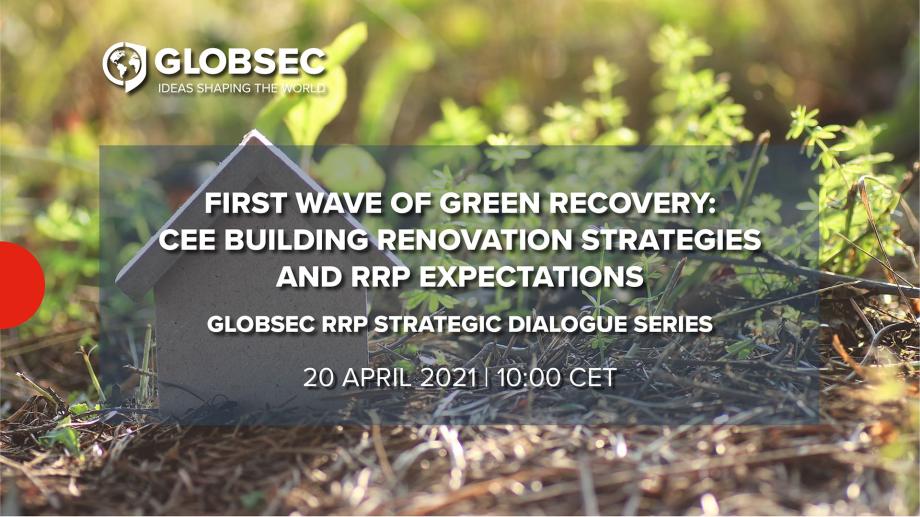Press release
First wave of green recovery: CEE building renovation strategies and RRP expectations: summary

Main Takeaways
- Slovakia’s RRP includes EUR 500 million for family housing under the Ministry of Environment and EUR 200 million for historic buildings
- Family housing
- A new scheme on top of existing programmes and replacing others as one-stop-shop supervised by Slovak Environmental Agency
- Overcoming challenges to motivate project applicants and beneficiaries
- Separate directorate with several regional one-stop shops close to the projects
- Large scale media campaign to communicate with citizens and ensure projects are done right
- Discussions with EBRD on a new type of financing
- 2021 preparing technical administrative support, IT system and implementation plan governing process
- 2022-2026: 30K especially older houses at least 30% energy savings primarily through roof restoration, insulation, upgrading windows and doors and replacement of boilers for heating and water
- Objectives aligned with long term national strategies
- Historical buildings
- Long term strategy for achieving decarbonisation of 2050 buildings stock requires an intensified depth of renovation giving more attention to medium and deep renovation
- Budget targeting public owners includes renovation information campaign, and educational seminars for professionals
- Renovation requires high-quality complete measures for thermal insulation, moisture elimination, renewables for heating and cooling, and automation and control systems
- Benchmark is at least 30% savings
- The vast majority of Poland’s RRP for building renovation is allocated to energy efficiency in residential buildings with EUR 3.2 billion aiming for 850,000 projects
- Key reforms
- Additional support for complex renovations, RES deployment and the social segment focused on multi-apartment buildings
- New provisions in Energy Efficiency Act related to public debt and EPCs, ESCOs
- Weaknesses
- The role of natural gas boilers are not elaborated
- Long term pathway for the Clean Air programme including phase-out of coal support from domestic funds is not clear
- No cross-cutting KPIs, no clear role of gas and an outdate strategic framework
- Czechia’s national plan has been developed to address domestic bottlenecks paralyzing investment activities, especially low green and digital project readiness and low use of public capital for financing
- Ministry of Regional Development will provide systematic support to public investors for massive upscaling using proper preparation according to EU green taxonomy with an initial benchmark of 150 smart green and digital public projects using EUR 100 million
- In Bulgaria, approximately EUR 1 billion of RRP is allocated to building renovation which is estimated to require some EUR 40 billion of investment
- High personal savings across Europe, and Bulgaria in particular, as a result of the pandemic, needs to be mobilized for the purpose of renovation
- EBRD has a long successful track record supporting CEE building renovation through direct finance of public and private sectors and bank intermediaries
- Supported Bulgarian and Slovak long term renovation strategies, provided an in-depth review of potential financing instruments and policy instruments to accelerate energy efficiency in Hungary, and applied the Green Economy Financing Facilities (GEFF) throughout CEE
- The main financial barrier is the long payback period for comprehensive deep renovation of older buildings in need of structural measures that are not suitable for ESCOs
- The goal is to provide well designed technical assistance for the successful implementation
- The residential category accounts for 70% of building sector emissions with most energy used for heating
- While long term 2050 goal is clear in the building sector requiring energy efficiency and renewable energy source solutions there is much uncertainty with pricing, policy level and human behaviour
- EPC is a great tool for industry and the public sector but still needs clear standards, incentives and public acceptance
- ESCOs have a strong business case with lighter renovations (heat, lighting and renewables)
- Lighting accounts for 40-50% of a city energy bill and LED can save up to 80% on lighting-related energy consumption
- Keeping in mind the many co-benefits of building renovation beyond energy savings, innovation, energy security, air quality and best suited to deliver flexible rapid employment in recovery
- CEE has inherited a terrible building stock and has not performed well to date in overall rates but COVID-19 provides new opportunities to mobilize public interest and savings
- Key reforms
- Family housing
Key Recommendations
- Further innovation and experimentation with blending available financial instruments to generate more funding and awaken private savings that have increased during the lockdown
- Countries need to underwrite long term finance for deep renovation with subsidies that can be combined/bundled with other public funds (e.g. addressing energy poverty) and some smaller ESCO contribution
- Government incentives and policies need to reinforce climate adaptation with financially attractive solutions for business and individual owners
- Creation of a large institutional centre at the national or regional level to support financial mixing and matching
- Organizations working with different governments need to draw and apply lessons learned and best practices to better enable the market
- More emphasis on multi-disciplinary national databases beyond just energy efficiency to ensure renovations are fit for purpose and future proof
- Energy poverty is significant in CEE and should be a key part of the wider renovation solution
Led by: John Barter, Senior Vice President, GLOBSEC
Keynote: Michal Kiča, State Secretary, Ministry of Environment, Slovakia
Kick-off speakers:
- Ladislava Cengelova, Director-General, Ministry of Transport and Construction, Slovakia
- Julian Popov, Chairman, Building Performance Institute Europe/former Minister of Environment, Bulgaria
- Aleksander Śniegocki, Head of the Energy, Climate and Environmental Programme, WiseEuropa
- Martina Sieber, Advisor to the Minister, Ministry of Regional Development, Czech Republic
- Pavel Kubicka, Director of Strategy & Member of the Board, CEZ ESCO
- Jan Mati, Business Development Director, Signify
- Remon Zakaria, Lead, Associate Director, Energy Efficiency and Climate Change, EBRD